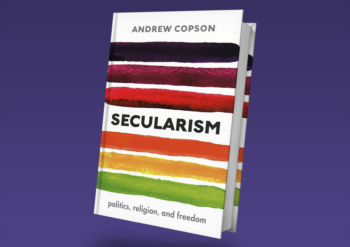
Marking three years since the publication of Secularism: Politics, Religion, and Freedom (right), by Andrew Copson, Humanists UK will on 18 January host an expert panel to discuss the themes laid out in the book, developments since publication, and what these trends might mean for the future of secularism.
The event, chaired by award-winning journalist and broadcaster Samira Ahmed will feature Humanists UK Chief Executive Andrew Copson, Associate Professor in International Human Rights Law Dr Nazila Ghanea, and Professor Tariq Modood, founding Director of the Centre for the Study of Ethnicity and Citizenship.
Three years after the publication of Secularism: Politics, Religion, and Freedom (later republished as Secularism: A Very Short Introduction), secularism remains a hot topic in public, political, and religious debate across the globe. It is a conflict seen in modern secular states – from France to India – and in the challenges they face from authoritarian populism and resurgent religious identity politics. The event, taking place on 18 January, will be an important discussion on where these trends are heading, of the rise of religiously intolerant states, and growing threats to secularism, human rights, and individual freedom around the world.
Tickets are available to purchase now.
|
Notes
Samira Ahmed is a multi-award winning journalist and broadcaster and a visiting professor of Journalism at Kingston University with a special focus on culture, politics and social change. She won Audio Broadcaster of the Year at the 2020 British Press Guild Awards for her work as a presenter of Front Row on Radio 4 and her podcast How I Found My Voice.
Andrew Copson is Chief Executive of Humanists UK, President of Humanists International, author of Secularism: Politics, Religion, and Freedom and, with Alice Roberts, The Little Book of Humanism.
Dr Nazila Ghanea is Associate Professor in International Human Rights Law at the University of Oxford. She serves as a member of the OSCE Panel of Experts on Freedom of Religion or Belief. Nazila’s research spans freedom of religion or belief, freedom of expression, women’s rights, minority rights and human rights in the Middle East. She has been invited to address UN expert seminars on seven occasions. Nazila has acted as a human rights consultant/expert for a number of governments, the UN, UNESCO, OSCE, the Commonwealth, the Council of Europe, and the EU. She has facilitated international human rights law training for a range of professional bodies around the world, lectured widely and carried out first hand human rights field research in a number of countries including Malaysia, Qatar, the United Arab Emirates, and the United Kingdom. She is a regular contributor to the media on human rights matters.
Professor Tariq Modood is founding Director of the Centre for the Study of Ethnicity and Citizenship, and is a Fellow of the British Academy in 2017. He is the co-founding editor of the international journal Ethnicities. His publications include Still Not Easy Being British: Struggles for a Multicultural Citizenship (2010); Secularism, Religion and Multicultural Citizenship (2009); Tolerance, Intolerance and Respect (2013); Religion in a Liberal State (2013); and Essays on Secularism and Multiculturalism (2019). He has been Adviser to the Muslim Council of Britain and has served on the Commission on Religion and Belief in British Public Life (2013–16).
